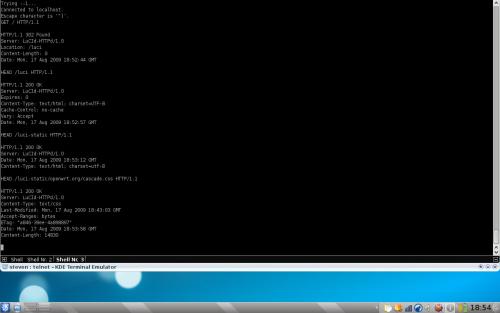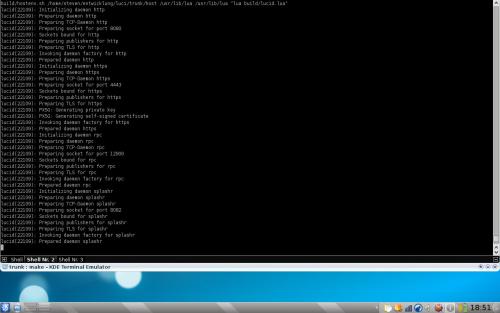HackerSpaceBrussels (HSB) announces the second Wireless Battle Mesh, which aims to test 3 popular WiFi routing protocols (OLSR, Batman and Babel), in Brussels on Saturday and Sunday 17-18 October 2009.

Wireless Mesh Battle: OLSR vs. BATMAN vs. Babel
Agenda
- Tue 06 Oct @ 21:00: final IRC meeting to prepare the design of the networks (see below)
- Sat 10 Oct @19:30: IPv6 presentation (Filip P.) + panel on possibilities & pittfalls of IPv6 for free networks
- Tue 13 Oct – Fri 16 Oct: OpenWRT workshops
(openwrt installation & configuration, kamikaze build environment,
ssh keys infrastructure, firmware generation, UCI configuration tool,
asterisk/ SIP phone) - Fri 16 Oct @ 18:00 : Deploy the nodes
- Sat 17 Oct @ 14:00: Deploy the nodes, setup tests
- Sat 17 Oct @ 19:00: concert "I’m sitting under an antenna" v.a., org. by OKNO
- Sun 18 Oct @ 14:00: The battle! 🙂
IRC meetings
We setup some IRC meetings to prepare the configuration: IP’s,
versions, and everything that took too much time at WBM v1. The
meetings will be held on the tuesdays of 15 and 22 September and 06
October at 21:00 CET on irc.freenode.net channel #hsbxl. People from
Brussels and around are invited to join us at the hackerspace.
Fee
The event is free. We’ll kindly ask you for a donation to cover some costs.
Location
Okno
Quai des Charbonnages 30-34
1080 Brussels
http://okno.be
http://tinyurl.com/oknomap
Transport
- Metro: Compte de Flandres / Graaf van Vlaanderen
- Train: Go to Brussels central station and take metro from there (metro 5 direction Erasmus)
- Route planner in Brussels
Registration
Space is limited, so we ask you to register in advance by registering:
- send an email with your name and surname to contact@voidpointer.be AND
- register on Doodle
Requirements
- Bring your laptop/computer
- Bring your compatible router(s) with OpenWRT pre-installed
- Bring your WiFi antenna(s) and connectors
Accomodation
- Zoobab is offering some free space to sleep (contact him at zoobab@gmail.com)
- If you have problems finding accomodation, let us know (contact@voidpointer.be) — there always be some couches free at HSB.
Contact
Email: contact@voidpointer.be
Tel (ptr_): +32 493 52 50 09
Tel (zoobab): +32 484 56 61 09
- Announcement: http://hackerspace.be/wbm2009v2
- http://www.olsr.org
- http://www.pps.jussieu.fr/~jch/software/babel/
- http://en.wikipedia.org/wiki/B.A.T.M.A.N.
- http://hackerspace.be/wbm2009
- http://www.tmplab.org/2009/02/16/first-tmplab-wireless-battle-mesh-april-11-12th-2009-tmplab/
- http://www.tmplab.org/wiki/index.php/Wireless_Battle_Mesh
- http://openwrt.org/
[via zoobab]






 screenshot of the "new freimap"
screenshot of the "new freimap"